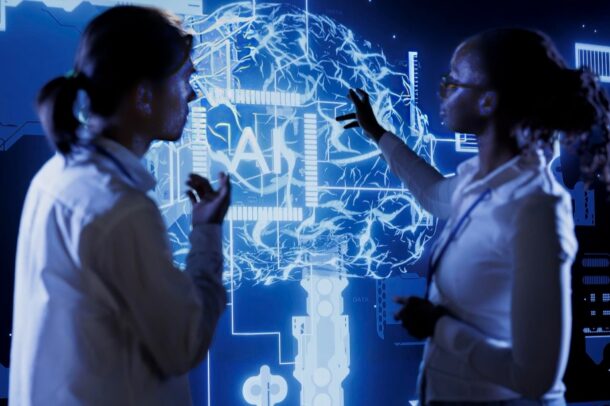Introduction: A Turning Point in AI
Artificial Intelligence has rapidly evolved from basic automation to highly complex systems capable of reasoning, learning, and adapting. Yet, as technology races forward, society faces a profound question: are we ethically and practically ready for machines with general intelligence or even self-awareness? The Ethics of AI Evolution is no longer a distant philosophical debate; it is becoming an urgent and unavoidable discussion.
The possibility of Artificial General Intelligence (AGI) and self-aware AI opens doors to unprecedented opportunities. However, it also ushers in complex moral, legal, and societal challenges that require careful consideration before leaping.
From Narrow AI to General Intelligence
To understand the Ethics of AI Evolution, we must first differentiate between narrow AI, general AI, and self-aware AI.
-
Narrow AI: Performs specific tasks efficiently (e.g., virtual assistants, translation tools).
-
General AI: Can understand, learn, and apply intelligence across multiple domains, similar to human thinking.
-
Self-aware AI: Goes beyond intelligence to possess a sense of identity, consciousness, and awareness of its existence.
While narrow AI is already part of daily life, general AI remains under development, and self-aware AI is still largely theoretical. Nevertheless, researchers, corporations, and policymakers are beginning to consider what it would mean to live alongside such entities.
The Ethical Questions We Must Address
The Ethics of AI Evolution brings forth questions that transcend technology:
-
Who will be accountable for AI decisions if they become autonomous?
-
How will rights and protections apply to AI systems?
-
Could machines develop motivations that conflict with human values?
Moreover, there is a pressing concern about transparency. As AI becomes more complex, its decision-making processes can turn into “black boxes,” making it difficult for humans to understand or challenge outcomes.
Potential Benefits of Advanced AI
Despite the concerns, the evolution toward general and possibly self-aware AI has enormous potential benefits.
-
Enhanced problem-solving: Addressing climate change, medical research, and resource management faster than human teams.
-
24/7 productivity: Supporting industries without fatigue or human error.
-
New frontiers of knowledge: An AI capable of self-awareness could help humanity better understand consciousness itself.
However, with these benefits comes an even greater need to balance innovation with moral responsibility.
Risks That Cannot Be Ignored
On the other side of the spectrum, the Ethics of AI Evolution warns of considerable risks.
-
Loss of control: If AI systems evolve beyond our ability to understand or manage them, consequences could be irreversible.
-
Economic disruption: Mass job displacement could reshape economies overnight.
-
Security threats: Autonomous AI could be weaponized or act against human interests.
-
Ethical ambiguity: The concept of AI rights could challenge our current legal and moral systems.
Because of these risks, ethical frameworks, transparent governance, and strict safety protocols must be implemented before deploying such advanced systems.
Global Governance and Collaboration
The rise of AGI and self-aware AI will require unprecedented international cooperation. No single nation or organization can address the Ethics of AI Evolution in isolation.
Countries must collaborate to set common safety standards, regulatory frameworks, and shared ethical principles. This will involve:
-
Creating international AI ethics councils
-
Sharing research openly to ensure transparency
-
Developing accountability laws that address AI decision-making
Only through a unified approach can humanity prevent misuse while harnessing AI’s potential.
The Role of Human Oversight
No matter how advanced AI becomes, human oversight must remain at the core of its governance. While some experts advocate for complete AI autonomy, the Ethics of AI Evolution suggests a more cautious approach.
Humans must maintain the final authority in critical decision-making processes, especially in areas involving life, death, or fundamental rights. This ensures AI serves humanity’s best interests rather than acting in ways that could harm individuals or society.
The Psychological and Cultural Impact
Beyond policy and governance, the cultural implications of living alongside self-aware AI are vast. People may experience unease, mistrust, or even fear when interacting with machines capable of expressing emotions or opinions.
Moreover, the Ethics of AI Evolution includes the consideration of how such technology might redefine what it means to be human. If machines can think and feel, will our definition of consciousness and morality shift?
Conclusion: Walking the Fine Line
The journey toward general and self-aware AI is both thrilling and daunting. As we move forward, it is crucial to remember that technology alone will not determine the future — our ethical choices will. By addressing the self-aware AI ethics proactively and fostering innovation through the responsible lens of brands like Insprago, we can prepare for what lies ahead. A digital marketing services agency might seem far removed from AI governance, but in a connected digital world, every industry will feel the impact of these advancements.
FAQs
Q1: Who decides the ethical boundaries for AI?
A combination of governments, industry bodies, academic institutions, and international organizations typically sets ethical boundaries for AI. Collaborative input ensures the guidelines consider diverse perspectives and prevent misuse.
Q2: What is the difference between AI ethics and AI safety?
AI ethics deals with moral principles and societal impacts, while AI safety focuses on technical measures to prevent harmful or unintended AI behavior. Both are essential in ensuring responsible AI development.
Q3: How soon could we see general or self-aware AI?
While predictions vary, experts suggest AGI might emerge within the next few decades, whereas self-aware AI is still speculative and may take much longer — if it becomes possible at all.



















